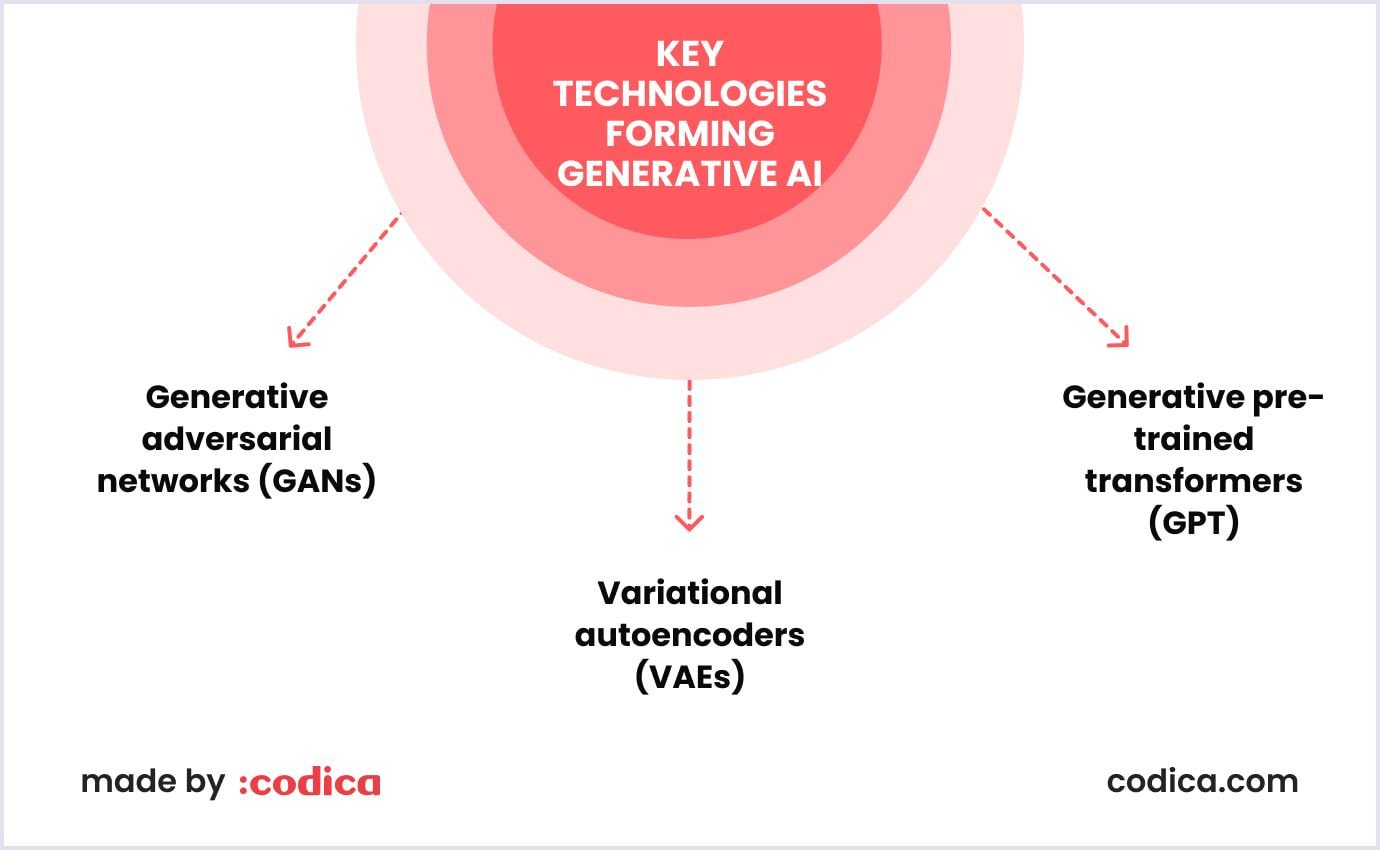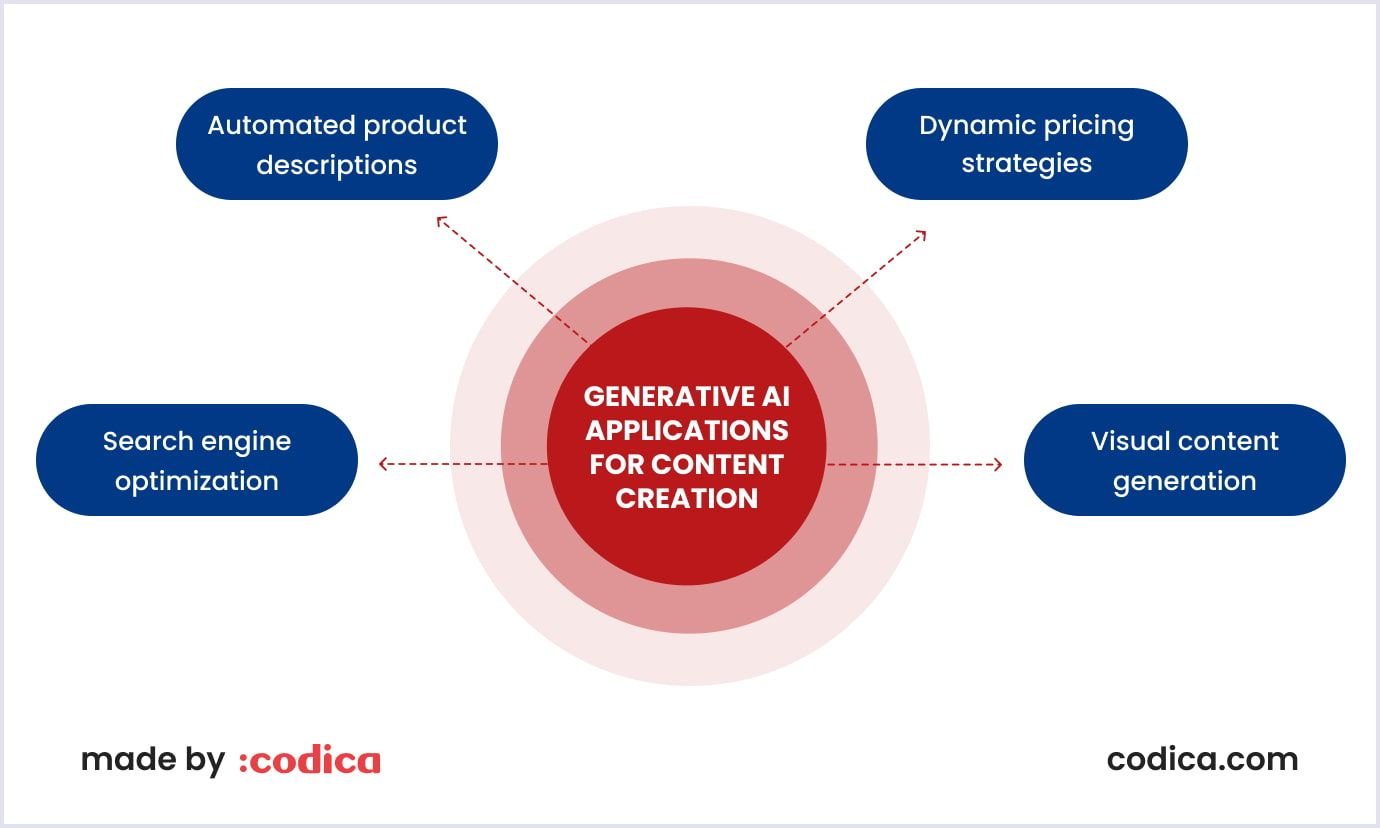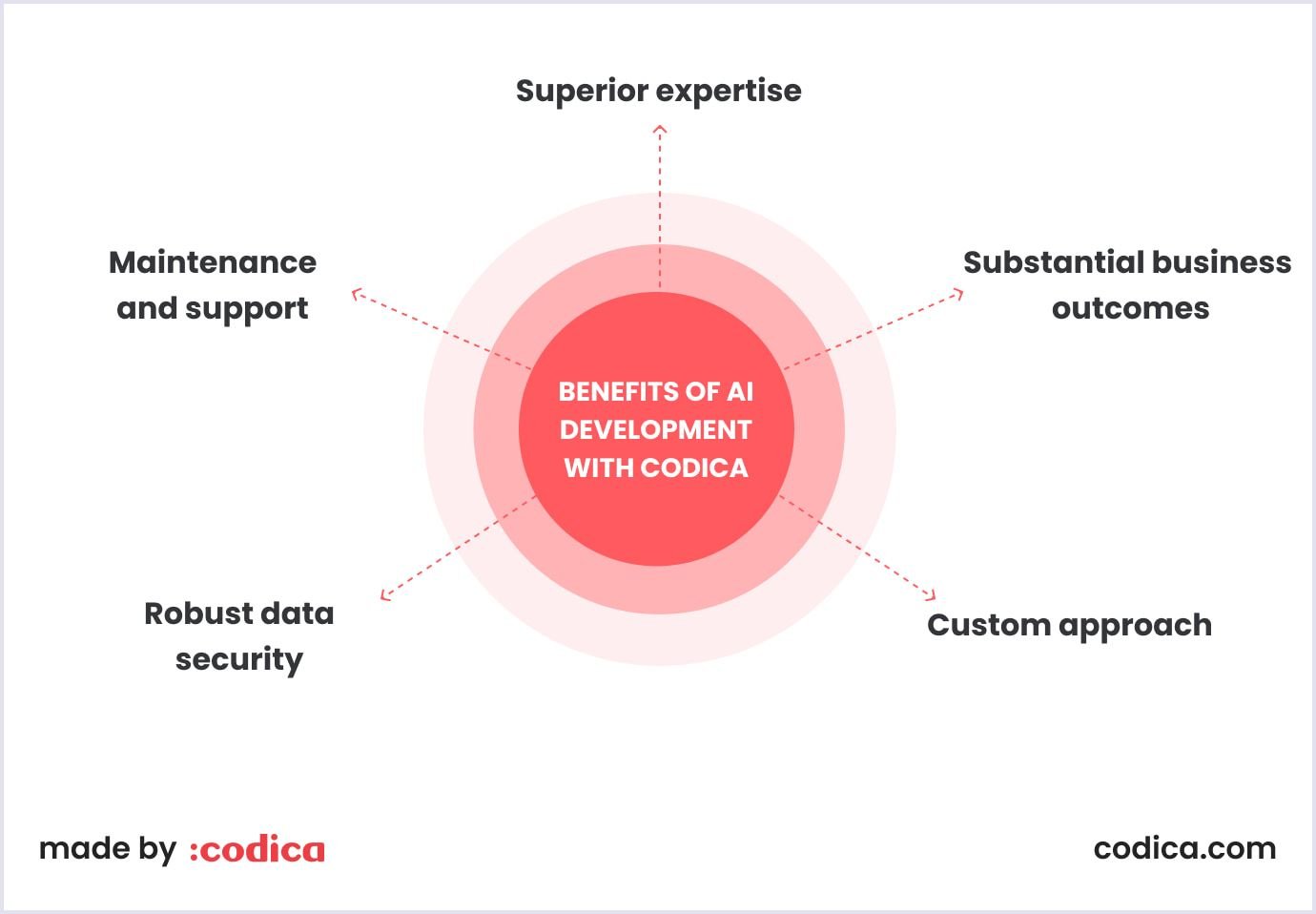A few years ago, the usefulness of AI integrations was controversial and seemed unreliable, to say the least. Now, numerous ecommerce solutions feature AI as one of their primary functionalities.
Generative AI, in particular, has become a lifesaver for businesses, offering tons of benefits. In this article, we’ll outline the role of generative AI in marketplace development, see how it affects businesses, and see what challenges are still topical.
Understanding generative AI
For starters, generative AI is a subclass of a giant “AI” term. In short, it creates new data based on the given dataset. Based on the data that’s fed to it, generative AI produces novel content in text, videoб and many other formats. Generative AI relies on several key technologies:

Generative adversarial networks (GANs).
It consists of two neural networks: the discriminator and the generator, where both work together. The generator is tasked with creating new data. The discriminator, in turn, evaluates it and checks its authenticity. The more the process is repeated, the more realistic data is generated, making GANs powerful tools for image and video synthesis.
Variational autoencoders (VAEs).
VAEs are a type of autoencoder that generates new data by learning the underlying distribution of the input data. They encode input data into a latent space and then decode it back into the original space, allowing the generation of new, similar data points.
Generative pre-trained transformers (GPT).
GPT models, such as GPT-3 and GPT-4, are advanced language models that create text that resembles a human-made one. These models use deep learning techniques to understand and produce coherent and contextually relevant text, making them valuable for natural language processing tasks.
Read also: A Complete Guide to AI Tech Stack
Benefits of generative AI in marketplaces
Now that theory is all covered, let’s move to the business side of things. First off, let’s see how generative AI is beneficial for marketplaces and ecommerce ventures.
Improved user experience. Generative AI greatly enhances user experience, which directly influences sales and retention. It provides personalized recommendations by analyzing user behavior and preferences, generates dynamic content like personalized emails and product descriptions. Besides, it enables virtual try-ons and simulations for niches like fashion and beauty. Lastly, it also improves customer support with AI-powered marketplace chatbots and virtual assistants.
Operational efficiency. Generative AI boosts operational effectiveness as it is perfect for optimizing resource allocation and automating tons of processes. It predicts product demand for better inventory management, analyzes supply chain data to identify inefficiencies, automates content generation for product descriptions and tags, and detects fraud by analyzing transaction patterns.
Innovation and creativity. Generative AI drives innovation and creativity on stable platforms. It aids in product design and development by creating ideas and prototypes, generates marketing content like ad texts and social media posts. Moreover, AI offers personalized shopping experiences with customized product assortments, and enables new business models like AI-driven subscription services that provide curated product selections.

Key applications of generative AI in marketplaces
AI can be implemented in various ways, all of which complement the platform. There are three key areas for its implementation.
Product recommendations
Being a super potent benefit, product recommendations enhanced by generative AI can be met on many major platforms. For more context, key areas of AI implementation regarding product recommendations include:
- Personalized recommendations. AI models are perfect at predicting what products a user might like based on their previous purchases and browsing history.
- Real-time suggestions. During a user’s browsing session, AI can provide real-time recommendations based on the items they are currently viewing. This approach can stimulate additional purchases, making sure users are engaged with the platform.
- Cross-selling and upselling. Generative AI can identify complementary products and suggest them to users, promoting cross-selling and upselling opportunities. This technique, in effect, boosts sales and helps users discover new products that fit their needs.
Content creation
To stay relevant, marketplaces and ecommerce ventures rely hugely on content. In turn, this task can be delegated to generative AI, which can significantly improve content creation processes. Here’s what you can potentially do:

- Automated product descriptions. AI can be used to generate cohesive and persuasive product descriptions based on key attributes and features. This can help with consistency, not to mention tons of time it saves for content creators.
- Dynamic pricing strategies. AI models can generate dynamic pricing recommendations based on market trends, competitor pricing, and demand fluctuations. This helps marketplaces stay competitive and maximize revenue.
- Visual content generation. Generative AI is super efficient for creating product video overviews and hi-res images. This is particularly useful for marketplaces with a large number of products, where manual content creation would be time-consuming.
- Search engine optimization. Speaking of content creation, AI can also make it SEO-friendly, optimizing it for search engines. For instance, it can suggest titles, tags, and descriptions to increase organic traffic and your platform’s online visibility.
Customer support
Apart from content creation, UX improvements, and other benefits, customer support is another huge benefit of AI implementation. Besides, there are a few ways to use it:
- AI-powered chatbots. These chatbots can work with various requests, providing info on products, shipment status, and other various instant responses to reduce the need for human intervention.
- Virtual assistants. Virtual assistants can guide users through the ordering process and assist them at every step. They can also handle post-purchase generic inquiries, such as returns and refunds.
- Sentiment analysis. AI can scan various channels, like social media, reviews, and others, to analyze sentiment and understand customer opinions on a given matter.
- Language translation. Generative AI can provide real-time language translation for customer support, enabling marketplaces to serve a global audience effectively.
Market analysis and insights
When it comes to analysis, generative AI can also be super helpful. Some models and tools provide the functionality for:
- Demand forecasting. AI models can predict future demand for certain products using info about previous purchases, current market trends, and a plethora of external factors. This way, AI can help you manage your inventory and suggest the right products to be available during their prime time.
- Competitor analysis. Gen AI can analyze your rivals’ pricing policies, what they offer, and strategies they stick to.
- Customer segmentation. AI can segment customers based on behavior and preferences to create more targeted marketing and personalized experiences.
- Sales and revenue prediction. AI models can forecast sales and revenue. This, in turn, helps marketplaces set realistic targets and make informed financial decisions.
Challenges and limitations
As with any technology, generative AI has its implementation challenges and certain limitations it can’t go beyond for now. Let’s see what are the most notable ones.
Data privacy and security
The usage of generative AI in marketplaces is often connected with significant challenges related to data privacy and security.
If you’re looking to implement AI, first of all, look into data breaches. It’s no secret that marketplaces collect and store tons of personal and transactional data. AI systems, in turn, require extensive datasets for training. Needless to mention that along with this, the risk of data breaches grows substantially. Consequently, consider implementing advanced security practices to protect sensitive information.
Besides, obtaining user consent for data collection and usage is crucial. Therefore, you need to clearly communicate how and what user data is used while providing them with ways to stop sharing certain data. This includes implementing opt-in and opt-out mechanisms for data sharing.
Lastly, you need to make sure that all aspects of your marketplace comply with data protection regulations such as GDPR, CCPA, and others. Marketplaces need to navigate complex legal landscapes and ensure their AI systems adhere to these regulations, which can be resource-intensive and challenging.
Ethical considerations
Generative AI often has a hard time with ethical issues. Hence, you need to think of ways to solve them even before implementing AI. Most commonly, you can meet:
- Bias and fairness. AI models can generate or even amplify biases they get from the training data. Thus, fairness and inclusivity should fine-tuned in your AI-driven systems.
- Transparency and accountability. Generative AI systems often come in a package, meaning that it is challenging to see how they actually work under the hood. On the other hand, marketplaces must strive for transparency and establish mechanisms for accountability to build trust with users and stakeholders.
- Manipulative practices. The ability of generative AI to create highly personalized content can be misused for manipulative marketing practices. Ensuring that AI-driven recommendations and content adhere to ethical standards and do not exploit users is essential.
Technical limitations
Despite their advanced capabilities, generative AI systems still have limitations that should be accounted for. First and foremost, it is about data quality.
Training AI models to be effective always requires high-quality and diverse datasets. For marketplaces, it may be difficult to obtain enough data, especially in niche segments or for new products with limited historical data.
Generative AI models, particularly large-scale ones like GPT-4, require substantial computational resources. Basically, the challenge lies in the fact that marketplaces strive to be scalable and efficient, yet scaling AI systems can be much more expensive and thus challenging.
Speaking of flexibility, integrating generative AI systems into existing marketplace infrastructures can be complex and resource-intensive. Hence, ensuring seamless integration while maintaining system performance and user experience requires careful planning and execution.
Lastly, remember that the effectiveness of generative AI models is very context-dependent. For instance, a model trained for product recommendations may not perform well in generating content or providing customer support. Tailoring AI models for specific tasks and continuously monitoring their performance is crucial.
Case studies
eBay
Among all generative AI in ecommerce examples, eBay is one of the most prominent. The platform has introduced AI-generated item descriptions and an improved background removal tool. Let’s see what these two are all about.

AI-generated item descriptions.
Available to all UK sellers in most categories on the eBay app, this feature suggests attention-grabbing item descriptions at the touch of a button. Sellers can use the suggested description as-is or customize it for more detail and accuracy to fit their business's unique voice. This feature saves time and speeds up the listing process, and it will soon be available on desktop.
Improved background removal tool.
eBay's upgraded background removal tool makes it easier to showcase items on a white background, increasing the chances of listings standing out. With one tap, the tool seamlessly creates a white background for item images without manual editing. This tool is available to all sellers in the eBay app and the advanced listing tool, with expansion to the desktop coming soon.
These AI-powered features aim to make it easier and faster for sellers to create standout listings. eBay continues to explore how AI tools can help users work more efficiently, with more time-saving features to come.
Etsy
This popular marketplace employs AI and machine learning to make it more organized, curated, and reliable. Among all the functionality, Etsy boasts the following the most:
- Enhanced search capabilities. Etsy integrates multiple search engine technologies to improve the relevance of search results. By incorporating relational data and semantic data, Etsy enhances the accuracy and relevance of its search results.
- Best of Etsy library. Machine learning has enabled Etsy to expand its "Best of Etsy" library, curated by merchandisers based on an item’s visual appeal, uniqueness, and craftsmanship. This curated selection helps highlight standout items on the platform.
- Policy enforcement. Etsy uses machine learning to detect and remove listings that violate its handmade policy, increasing enforcement efficiency. In the first half of 2023, Etsy removed 29% more violating listings than in the second half of 2022.
Shopify
Shopify leverages AI to streamline operations for merchants, enhancing efficiency and scalability.
- Shopify Magic. Launched in April, Shopify Magic is an AI-enabled technology designed to save merchants time during storefront setup. Initially, it generated product descriptions, but its capabilities have since expanded to include generating blog posts, email subject lines, and headings for online stores.

- Sidekick. Shopify introduced Sidekick, an AI-enabled commerce assistant that aids small business owners in starting and scaling their businesses. Sidekick helps analyze sales, ideate store designs, and provide instructions on running promotions.
AI integration across Shopify. By embedding AI throughout the Shopify platform, merchants can build and scale their businesses more quickly and efficiently. AI tools enable businesses to make data-driven decisions, optimize operations, and achieve greater success from the first sale to full scale.
Read also: Artificial Intelligence Examples: How Alibaba, Amazon, and Others Use AI
Codica's expertise in AI implementation
Once you decide to implement AI into your ecommerce operations, the AI development services we provide at Codica will be a perfect choice. Partnering with us can bring several substantial benefits.

- Superior expertise. With over 50 completed projects in a plethora of industries, our expert team is highly skilled in AI app development. From conception to support, we ensure top-notch results.
- Substantial business outcomes. We maximize the benefits of AI technologies for our clients, delivering measurable results such as cost savings, revenue growth, and a high return on investment.
- Custom approach. Every project is unique, and we meticulously tailor our services to meet your specific needs and vision. We find the best ways to guide you toward excellence.
- Robust data security. We prioritize security standards and regulations, ensuring your AI solution is protected against vulnerabilities and cyberattacks.
- Maintenance and support. We provide continuous updates and troubleshooting to keep your solution running smoothly, and we are dedicated to maximizing its efficiency and addressing your needs.
After all, creating an AI marketplace can be a tedious and super challenging process, requiring tons of work. Hence, outsourcing this process would be a beneficial idea, leaving you enough space and resources to continue efficiently manage your marketplace.
Conclusion
In the aftermath, generative AI’s presence in the marketplace and ecommerce solutions only grows. It gets substantially more popular each year. Hence, it would be wise to catch a train and step along with the innovation.
Considering the sheer amount of benefits the AI implementation provides, it obviously is a super potent investment. Yet, if you struggle or are unsure of it, feel free to contact us so that our team can help! Besides, if there are other aspects of AI implementation budging you, dive into our blog to find out more.
